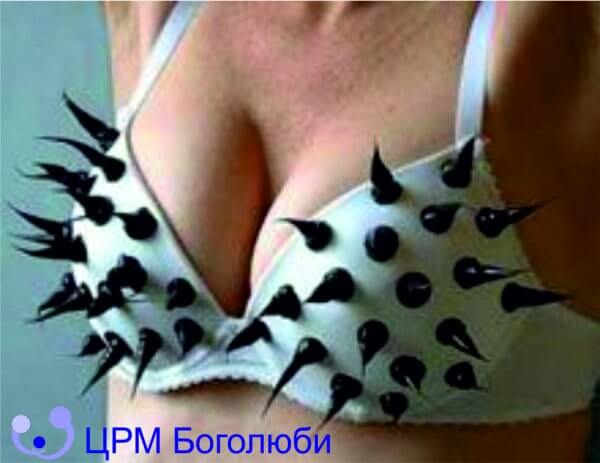Mastalgia - intermittent pain in the mammary gland is extremely common. It is estimated that 7 out of 10 women suffer from this type of disorder. Most of the time, pain in the gland coincides with the premenstrual period and increases as menstruation approaches, followed by regression over the next few days.
It is believed that such chest pains are directly dependent on the hormonal background of the patient: the breast tissue is very delicate and sensitive to hormonal fluctuations that occur every month. It must be remembered that pain in the mammary gland associated with the menstrual cycle does not hide any pathological disorders. In a sense, this is a natural phenomenon.
Usually, a few days before the onset of menstruation, mastalgia becomes so pronounced that discomfort causes even ordinary contact with the fabric of underwear. As a rule, at first painful sensations are perceived by the upper part of the breast, and then sent to the inside of the arm. Typically, both mammary glands become painful. It should be remembered that mastalgia is often associated with an enlargement of the gland, accompanied by the formation of a number of small solid masses in the thickness of the tissue. These "nodules" tend to resolve immediately after menstruation. Pain in the gland is intensified during sports (running), sexual activity, lifting heavy objects.
When should you be worried?
To distinguish between classic breast pain associated with premenstrual syndrome and potentially pathological syndrome, every woman should know her body well and correctly interpret the signals it sends.
It is very important to carry out periodic self-testing, which consists in carefully monitoring the appearance, size and shape of the mammary gland itself, as well as palpation. An experienced gynecologist or mammologist should instruct the woman on the proper self-test technique. Indeed, thanks to such simple and affordable actions, the patient will be able to recognize the beginning of an abnormal process in time.
Mastalgia should not encourage unnecessary anxiety when:
- it regresses after menstruation;
- the shape of the breast is not changed;
- there are no discharge from the nipples.
However, you must visit doctor if:
- the pain in the gland is localized at a certain point and does not go away after taking the pain medication;
- after the cessation of menstruation, the pain does not stop;
- breast pain interferes with daily activities;
- «Nodules» do not resolve after menstruation;
- pain lasts more than 15 days a month.
To avoid panic, we recall that, contrary to popular belief, breast cancer very rarely begins with breast pain.
Treatment of mastalgia
Fortunately, mastalgia lasts a short time and there is no point in resorting to any potent means. A woman can take oral analgesics such as ibuprofen and acetaminophen to alleviate the condition. Locally, ointments or gels with an active substance such as diclofenac can be used.
You should be aware that some drugs for the treatment of hypertension and antidepressants can aggravate breast tenderness. Useful in the treatment of mastalgia can be relaxation courses - yoga, Pilates, as well as the restriction of stimulating drinks - coffee, cola. If necessary, it makes sense to follow a low-calorie diet.
















